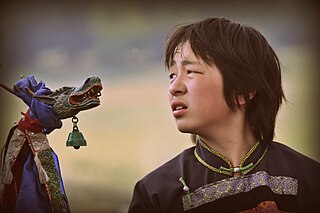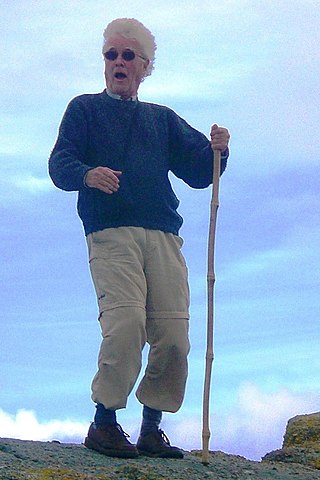Piers Vitebsky is an anthropologist who was Head of Anthropology and Russian Northern Studies and Assistant Director of Research at the Scott Polar Research Institute of the University of Cambridge in England. [1] [2] [3]
Piers Vitebsky is an anthropologist who was Head of Anthropology and Russian Northern Studies and Assistant Director of Research at the Scott Polar Research Institute of the University of Cambridge in England. [1] [2] [3]
Vitebsky studied his undergraduate degree in Classics with Modern and Medieval Languages at King's College, Cambridge, graduating in 1971. [4] He then went on to take a diploma in Social Anthropology at Oxford University. In the late seventies he was an affiliated student at the Delhi School of Economics. Eventually he completed his PhD at the School of Oriental and African Studies in London in 1982.
Since the 1980s, Vitebsky has carried out long-term fieldwork among with the Evens of Siberia, and among shamans and shifting cultivators in tribal India and Sri Lanka. In the Russian Arctic, he was the first westerner since the Revolution to live long-term with an indigenous community. Only after working for several months at the Museum of Anthropology and Ethnography in Leningrad was he allowed to fly out to Yakutsk in 1988.
From 1986 to 2016, Vitebsky was Head of Anthropology and Russian Northern Studies at the Scott Polar Research Institute of the University of Cambridge. Until his retirement he was Assistant Director of Research at the institute. His other appointments include Professor II at the University of Tromsø in Norway, Honorary Academician of the Academy of Sciences of the Republic of Sakha (Yakutia), and Honorary Professor at the North-Eastern Federal University in the Russian Far East. [5]
His current focus is on reindeer herders' perceptions of and responses to climate change.
Vitebsky's numerous documentary film collaborations include 'Arctic aviators' (National Geographic) and 'Flightpaths to the gods' (BBC2, on the Nazca lines in Peru), and 'Siberia: after the shaman' (Channel 4), which won first prize at the Film Festival of the European Foundation for the Environment and was screened at the Margaret Mead Film Festival in New York City.
Vitebsky has won the Gilchrist Expedition Award from the Royal Geographical Society. In 2006 he won the Kiriyama Prize for non-fiction. He was also runner up for the Victor Turner Prize for Ethnographic Writing in 2007 - awarded annually by Society for Humanistic Anthropology, American Anthropological Association.

Shamanism or samanism is a religious practice that involves a practitioner interacting with the spirit world through altered states of consciousness, such as trance. The goal of this is usually to direct spirits or spiritual energies into the physical world for the purpose of healing, divination, or to aid human beings in some other way.

The Evenki, also known as the Evenks and formerly as the Tungus, are a Tungusic people of North Asia. In Russia, the Evenki are recognised as one of the Indigenous peoples of the Russian North, with a population of 38,396. In China, the Evenki form one of the 56 ethnic groups officially recognised by the People's Republic of China, with a population of 30,875. There are 537 Evenki in Mongolia, called Khamnigan in the Mongolian language.

The reindeer or caribou is a species of deer with circumpolar distribution, native to Arctic, subarctic, tundra, boreal, and mountainous regions of Northern Europe, Siberia, and North America. It is the only representative of the genus Rangifer. More recent studies suggest the splitting of reindeer and caribou into six distinct species over their range.

The Nenets, also known as Samoyeds, are a Samoyedic ethnic group native to Arctic Russia, Russian Far North. According to the latest census in 2021, there were 49,646 Nenets in the Russian Federation, most of them living in the Yamalo-Nenets Autonomous Okrug, Nenets Autonomous Okrug and Taymyrsky Dolgano-Nenetsky District stretching along the coastline of the Arctic Ocean near the Arctic Circle between Kola and Taymyr peninsulas. The Nenets people speak either the Tundra or Forest Nenets languages. In the Russian Federation they have a status of Indigenous small-numbered peoples. Today, the Nenets people face numerous challenges from the state and oil and gas companies that threaten the environment and their way of life. As a result, many cite a rise in locally based activism.

The Nganasans are a Uralic people of the Samoyedic branch native to the Taymyr Peninsula in north Siberia. In the Russian Federation, they are recognized as one of the Indigenous peoples of the Russian North. They reside primarily in the settlements of Ust-Avam, Volochanka, and Novaya in the Taymyrsky Dolgano-Nenetsky District of Krasnoyarsk Krai, with smaller populations residing in the towns of Dudinka and Norilsk as well.

The Evens /əˈvɛn/ are a people in Siberia and the Russian Far East. They live in regions of the Magadan Oblast and Kamchatka Krai and northern parts of Sakha east of the Lena River, although they are a nomadic people. According to the 2002 census, there were 19,071 Evens in Russia. According to the 2010 census, there were 22,383 Evens in Russia. They speak their own language called Even, one of the Tungusic languages; it is heavily influenced by their lifestyle and reindeer herding. It is also closely related to the language of their neighbors, the Evenks. The Evens are close to the Evenks by their origins and culture, having migrated with them from central China over 10,000 years ago. Officially, they have been considered to be of Orthodox faith since the 19th century, though the Evens have retained some pre-Christian practices, such as shamanism. Traditional Even life is centered upon nomadic pastoralism of domesticated reindeer, supplemented with hunting, fishing and animal-trapping. Outside of Russia, there are 104 Evens in Ukraine, 19 of whom spoke Even.

The Soyot are an ethnic group of Samoyedic and Turkic origin who live mainly in the Oka region in the Okinsky District in Buryatia, Russia. They share much of their history with the Tofalar, Tozhu Tuvans, Dukha, and Buryat; the Soyot have taken on a great deal of Buryat cultural influence and were grouped together with them under Soviet policy. Due to intermarriage between Soyots and Buryats, the Soyot population is heavily mixed with the Buryat. In 2000, they were reinstated as a distinct ethnic group.

The Scott Polar Research Institute (SPRI) is a centre for research into the polar regions and glaciology worldwide. It is a sub-department of the Department of Geography in the University of Cambridge, located on Lensfield Road in the south of Cambridge.

The Sora are a Munda ethnic group from eastern India. They live in southern Odisha and north coastal Andhra Pradesh.

A large minority of people in North Asia, particularly in Siberia, follow the religio-cultural practices of shamanism. Some researchers regard Siberia as the heartland of shamanism.
Shamanism in various cultures shows great diversity. In some cultures, shamanic music may intentionally mimic natural sounds, sometimes with onomatopoeia. Imitation of natural sounds may also serve other functions not necessarily related to shamanism, such as luring in the hunt; and entertainment.
Sevʹyan Izrailevich Vainshtein was a Russian ethnographer, archaeologist, and historian of Siberian and Central Asian peoples. He was a professor at the Institute of Ethnology and Anthropology of the Russian Academy of Sciences in Moscow.
Caroline Humphrey, Baroness Rees of Ludlow, is a British anthropologist and academic.

Rane Willerslev is a Danish anthropologist. In his academic career, he has travelled extensively and has a particular interest in primitive tribal cultures, both present and prehistoric. On 1 July 2017, he was appointed director of the National Museum of Denmark by Culture Minister Mette Bock.

Reindeer in Siberian shamanism reflect the cultural, as well as the economic, relationship between the native peoples of Siberia, a region of Northern Asia, and the reindeer that live there. It involves the nomadic reindeer herders, those that hunt wild reindeer and those who maintain domesticated ones. Their religious beliefs reflect the spiritual philosophy of shamanism, and their traditions often involve reindeer in several steps of the process of practicing their religion.

The Yakutian Laika is an ancient working dog breed that originated in the Arctic seashore of the Sakha (Yakutia) Republic. Yakutian Laikas are multipurpose laikas, with many lineages able to herd reindeer, hunt game and/or pull a sled. They are registered with the Russian Kennel Club, the FCI and the AKC's Foundation Stock Service in 2017.

Reindeer in Russia include tundra and forest reindeer and are subspecies of Rangifer tarandus. Tundra reindeer include the Novaya Zemlya (R.t.pearsoni) and Sápmi subspecies and the Siberian tundra reindeer.
Ethel John Lindgren was an American-born British ethnologist and anthropologist who studied the customs of nomadic herders and shamanism in Manchuria apart from folkloristic studies. She was a major influence on a generation of English field anthropologists through her teaching at Cambridge University.

Bernhard Eduardovich Petri was a Russian anthropologist and archaeologist. Petri organized archeology and ethnographic expeditions to Lake Baikal, while employed by the Kunstkamera during the 1910s.

Robert Patrick Barten Paine was a British-born Canadian anthropologist whose primary areas of study were the Saami people of northern Scandinavia and the Inuit, though he also published on topics as diverse as the Jewish settlers of the West Bank and the purpose of gossip. He served as chair of the combined departments of Sociology and Anthropology at Memorial University of Newfoundland.